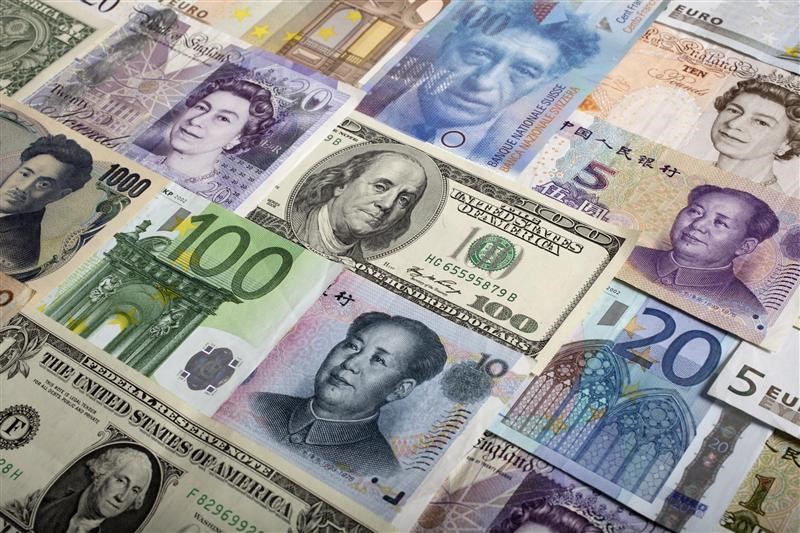* Indian rupee leads losses in the region
* Ringgit pares gains as oil prices fall
* Philippine peso set for weekly gain of 1%
(Adds text, updates prices)
By Shriya Ramakrishnan
April 3 (Reuters) - Most Asian currencies fell on Friday and
were on course to record weekly losses, as investors latched on
to the safety of the U.S. dollar due to the worsening economic
impact from the coronavirus pandemic.
While governments and central banks have stepped in with
stimulus measures, enforced lockdowns and flooded markets with
liquidity, risk appetite remains subdued due to a continued rise
in cases of the flu-like illness.
Data on Thursday showed global coronavirus cases surpassed
one million with more than 52,000 deaths, while weekly jobless
claims shot to a record high of more than 6 million last week in
the United States. The South Korean won KRW=KFTC and Singapore dollar dipped
0.2% each, and were on track to record a weekly loss of 1.7% and
0.4%, respectively.
The Malaysian ringgit MYR= pared early gains to trade flat
as oil prices reversed course following their biggest one-day
gains in the previous session. O/R
Fluctuations in crude prices had an impact on the ringgit,
as Malaysia is a net exporter of the commodity.
The Indonesian rupiah IDR=ID was little changed, while the
onshore Chinese yuan CNY=CFXS dropped up to 0.2%, led by the
central bank's weakest guidance since the 2008 global financial
crisis. CNY/
Indonesia's foreign exchange reserves dropped by some $9
billion in March, as Bank Indonesia intensified market
intervention to manage the depreciation in the rupiah amid
capital outflows. Meanwhile, the Philippine peso PHP= gained 0.2% and was
set to be the top performer in the region this week with a
weekly gain of 1%.
"The Philippines has relatively more monetary policy space,
both conventional and non-conventional, compared to some of its
regional peers, while still boasting of positive real interest
rates," Han Tan, a market analyst at FXTM said.
"Having adequate buffers, both on the monetary and fiscal
sides, can shore up investor confidence that policymakers are
able to mitigate some of the negative impact of COVID-19."
Financial markets in Taiwan were closed for a holiday.
INDIAN RUPEE
The Indian rupee INR=IN slipped as much as 0.7% to 76.085
against the dollar, two days after resuming trade.
A 21-day nationwide lockdown to curb coronavirus from
spreading has raised fears of a damaging impact on the
already-slowing economy.
Foreigners sold $8.13 billion worth of Indian bonds in
March, the biggest monthly outflow since at least Jan. 2002.
A Reuters poll also showed that the rupee will probably cut
some of its losses in the next year, but it's likely to stay
weak along with other emerging-market currencies until the
coronavirus pandemic subsides. CURRENCIES VS U.S. DOLLAR
Change on the day at
0633 GMT
Currency Latest bid Previous Pct
day Move
Japan yen 107.940 107.9 -0.04
Sing dlr 1.434 1.4304 -0.22
Korean won 1230.900 1228.3 -0.21
Baht 32.890 32.88 -0.03
Peso 50.630 50.72 +0.18
Rupiah 16452.000 16470 +0.11
Rupee 75.940 75.55 -0.51
Ringgit 4.355 4.355 +0.00
Yuan 7.091 7.0821 -0.12
Change so far in 2020
Currency Latest bid End 2019 Pct
Move
Japan yen 107.940 108.61 +0.62
Sing dlr 1.434 1.3444 -6.22
Korean won 1230.900 1156.40 -6.05
Baht 32.890 29.91 -9.06
Peso 50.630 50.65 +0.04
Rupiah 16452.000 13880 -15.63
Rupee 75.940 71.38 -6.00
Ringgit 4.355 4.0890 -6.11
Yuan 7.091 6.9632 -1.80
